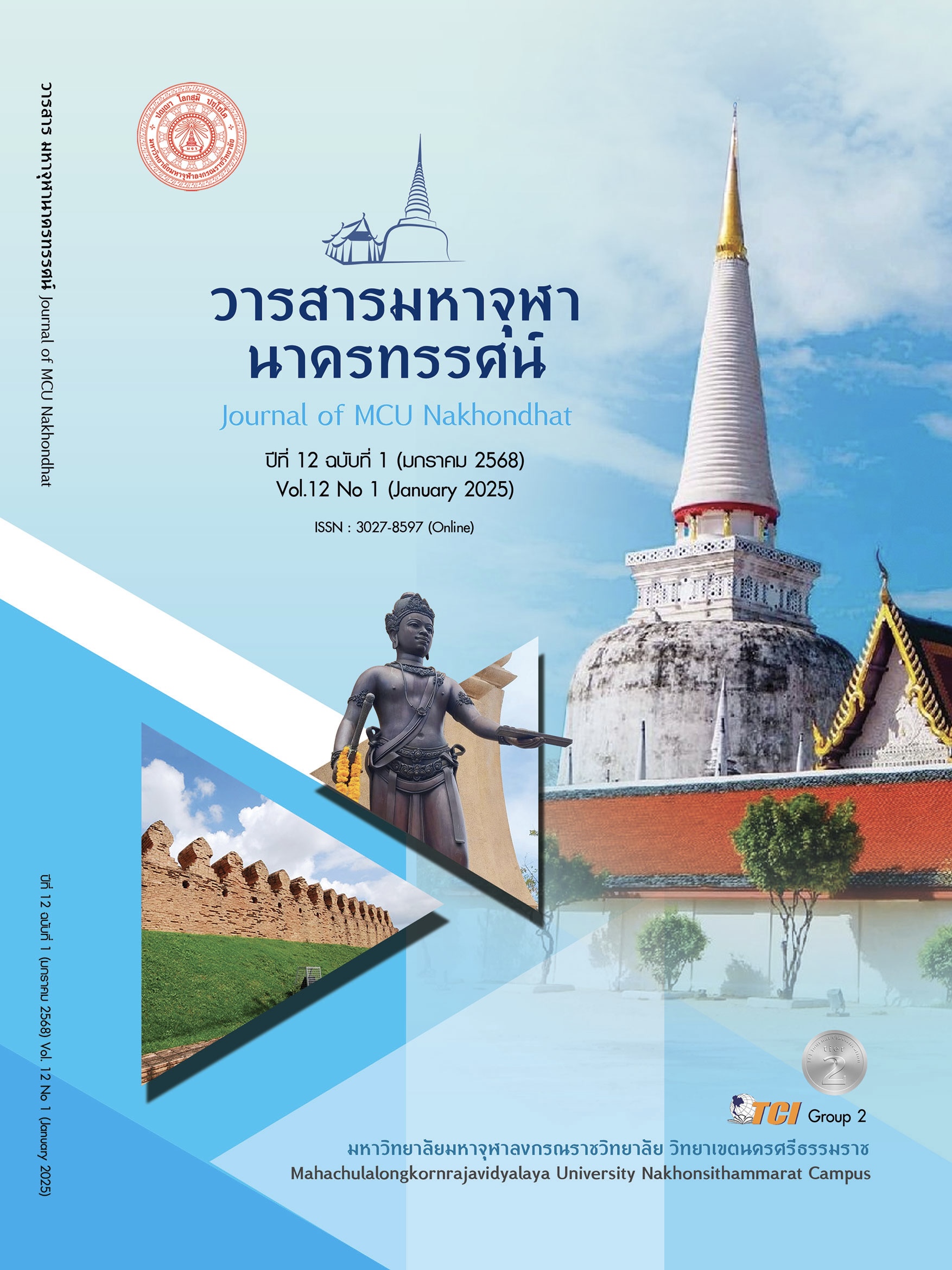4 ITDHIPADA (BASIS FOR SUCCESS) FOR SOLVING POVERTY PROBLEMS AFTER THE COVID-19 OUTBREAK
Main Article Content
Abstract
This academic article presents the post-COVID-19 pandemic situation, including the impacts resulting from the COVID-19 outbreak. situation, and guidelines for applying the principles of Dhamma, namely the 4 ITDHIPADA, to solving poverty problems after the COVID-19 outbreak. Even though the COVID-19 epidemic has passed since 2019 until now, 5 years have passed. But the impact of the COVID-19 outbreak still ongoing, there are still people infected with COVID-19. There are more than 300 new cases per day and the cumulative number of patients is 38,236 (15 September 2024). There are negative impacts that have been a problem until now, namely health, economic and social impacts. Application of the 4 ITDHIPADA in daily life, namely 1) Chantha, having love and being satisfied with what one is doing. Makes it possible to see guidelines or things that need to be changed in work. 2) Wiriya: having perseverance and continuous diligence. If you intend to work with diligence Perseverance will help make the work you are doing successful, not forget to practice and always develop themself. 3) Chitta is attentive, committed, and responsible for things, especially caring and responsible for the work one has been assigned. If you work with love, diligence, and responsibility for your work, then It is one of the ways that help the work be successful. and 4) Vimansa means awareness and reflection on cause and effect In each work, principles and reasons must be taken, using skill and intelligence. In order to do the job correctly and not make mistakes next time.
Article Details

This work is licensed under a Creative Commons Attribution-NonCommercial-NoDerivatives 4.0 International License.
References
กรมควบคุมโรค. (2564). แนวปฏิบัติในการป้องกันควบคุมโรคไวรัสโคโรนา 2019 สำหรับสถานที่ประกอบพิธีกรรมทางศาสนา (วัด โบสถ์ มัสยิด ศาลเจ้า). เรียกใช้เมื่อ 8 กันยายน 2567 จาก https://ddc.moph.go.th/viralpneumonia/file/measure/mea_religious_040363.pdf
พระธรรมปิฎก (ป.อ. ปยุตฺโต). (2538). จิตวิทยาเพื่อการพัฒนาคนตามแนวธรรมชาติ. กรุงเทพมหานคร: บริษัทสหธรรมิก จำกัด.
พระธรรมปิฎก (ป.อ. ปยุตฺโต). (2542). การศึกษากับการพัฒนาทรัพยากรมนุษย์. กรุงเทพมหานคร: บริษัทสหธรรมิก จำกัด.
พระธรรมปิฎก (ป.อ. ปยุตฺโต). (2545). ธรรมนูญชีวิต. กรุงเทพมหานคร: โรงพิมพ์กรมศาสนา.
พระธรรมปิฎก (ป.อ. ปยุตฺโต). (2549). พุทธธรรม ฉบับปรับปรุง และขยายความ. (พิมพ์ครั้งที่ 11). กรุงเทพมหานคร: โรงพิมพ์ บริษัท สหธรรมิก จำกัด.
พุทธทาสภิกขุ. (2537). การทำงานที่เป็นสุข. กรุงเทพมหานคร: ธรรมสภา.
มหาจุฬาลงกรณราชวิทยาลัย. (2539). พระไตรปิฎกฉบับภาษาไทย ฉบับมหาจุฬาลงกรณราชวิทยาลัย. กรุงเทพมหานคร: โรงพิมพ์มหาจุฬาลงกรณราชวิทยาลัย.
สถาบันส่งเสริมความปลอดภัย อาชีวอนามัย และสภาพแวดล้อมในการทำงาน (องค์การมหาชน). (2566). ชีวิตวิถีใหม่. เรียกใช้เมื่อ 15 กันยายน 2567 จาก https://www.tosh.or.th/covid-19/index.php/new-normal
สัญญา สัญญาวิวัฒน์. (2550). การบริหารจัดการแนวพุทธ. กรุงเทพมหานคร: ศูนย์หนังสือแห่งจุฬาลงกรณ์มหาวิทยาลัย.
สำนักงานคณะกรรมการสุขภาพแห่งชาติ. (2567). ส่องสังคมไทยหลังโควิด19 ตอกย้ำความสำคัญการกระจายอำนาจ ปูทางสู่การปฏิรูปประเทศ. เรียกใช้เมื่อ 15 กันยายน 2567 จาก https://www.nationalhealth.or.th/en/node/2242


